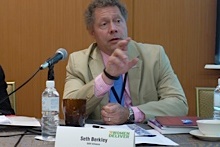
Dr Seth Berkley, CEO of the GAVI Alliance, speaking at the Women Deliver 2013 conference in Kuala Lumpur on the theme of 'healthy girls, healthy women'
Kuala Lumpur, 29 May 2013 – Two new vaccines that help protect against cervical cancer, measles and rubella are spearheading the GAVI Alliance’s commitment to improving the health of girls and women.
With GAVI support, over 30 million girls in over 40 countries will be protected against cervical cancer with human papillomavirus (HPV) vaccines by 2020, preventing over half a million deaths.
For the first time, the Alliance is also supporting a vaccine against rubella - a disease that can cause miscarriage, stillbirth and severe birth defects in babies. The combined measles-rubella (MR) vaccine will be introduced in 49 countries by 2020, immunising over 700 million children under 15 years of age.
Central to GAVI's mission
“Protecting the health of girls, women and infants is central to GAVI’s mission. Our new investments in HPV and rubella vaccines will ensure that all girls can be protected against cervical cancer and babies can be protected from rubella no matter where they are born,” said Dr Seth Berkley, CEO of the GAVI Alliance, who is speaking at various events during the Women Deliver 2013 conference in Kuala Lumpur on the theme of ‘healthy girls, healthy women’. “Our ultimate goal is to ensure that girls all over the world have access to the full immunisation package of vaccines against 12 life-threatening diseases.”
Immunising girls, protecting future generations
By supporting countries to vaccinate girls aged nine to 13 against HPV, GAVI is helping to protect future generations of women against cervical cancer, the leading cancer killer of women in many African countries and in the 56 countries eligible for GAVI support. In developing countries, access to cancer screening and treatment is often lacking, making HPV vaccines the best tool against cervical cancer.
Vaccinating this age group also provides a window of opportunity to deliver other health services linked to sexual and reproductive health as well as nutrition.
Record low price
“Cervical cancer is an issue that I feel very strongly about, and I’m really looking forward to seeing developing countries getting access to HPV vaccines,” said Dr Christine Kaseba, First Lady of the Republic of Zambia. “When you look at the cancer burden in developing countries, especially in Africa, it’s clear we cannot withstand a cancer epidemic. So we really must do something, and this is why I am so happy that GAVI has invested so much in the provision of HPV vaccine.”
Earlier this month, GAVI announced a record low price for HPV vaccines, which means the world’s poorest countries will now have access to a sustainable supply of HPV vaccines for as low as US$ 4.50 per dose. The same vaccines can cost more than $100 per dose in developed countries and the previous lowest public sector price was $13 per dose.
Our ultimate goal is to ensure that girls all over the world have access to the full immunisation package of vaccines against 12 life-threatening diseases.
Dr Seth Berkley, CEO of the GAVI Alliance
First country to deliver HPV vaccines with GAVI support
Less than a week after the HPV vaccine price announcement, Kenya became the first country to deliver the HPV vaccines with GAVI support. The vaccines will initially be introduced in a district in Kenya, as part of an HPV demonstration project, to identify the best ways to deliver the vaccines nationally.
GAVI plans to introduce the HPV vaccine in Ghana, Lao PDR, Madagascar, Malawi, Niger, and Sierra Leone in 2013 and in the United Republic of Tanzania in early 2014. Rwanda will become the first country to nationally roll out HPV vaccine with GAVI support next year. Since 2011, it has been rolling out the vaccine with donations from Merck & Co.
Having time lag
Speaking at Women Deliver 2013, Genevieve Sambhi, cervical cancer survivor and a model from Malaysia said: “Having been through cervical cancer, I believe no woman should have to go through what I did. The HPV vaccine is over 70% effective against cervical cancer, and I am so happy that GAVI Alliance has announced a new low price for the vaccine, allowing all girls to now be vaccinated. My daughter will be vaccinated when she is older, so that she will never have to go through what I did.”
In addition to ensuring that vaccines are affordable to poor countries, with the HPV vaccine, GAVI halved the time lag that can exist in getting vaccines out to poor countries, down to just six years.
Investing in rubella
Rubella, also known as “German measles”, is very contagious but causes relatively mild disease in children. More than 100,000 children are born with the birth defects (blindness, deafness and heart defects), known as Congenital Rubella Syndrome (CRS), each year – of which 90,000 live in GAVI’s eligible countries. The vaccine has been available since the 1970s and no longer poses a threat in many countries, but it remains underused in some regions, particularly Africa and South Asia.
Working with the Measles & Rubella Initiative, GAVI is introducing the rubella vaccine in combination with measles, thereby building on GAVI’s long term support for measles control.
In March this year, Rwanda became the first sub-Saharan African country to introduce the MR vaccine nationwide with GAVI support. Five other countries plan to launch measles-rubella campaigns this year – Bangladesh, Cambodia, Ghana, Senegal and Vietnam.
GAVI is funded by governments [Australia, Canada, Denmark, France, Germany, Ireland, Italy, Japan, Luxembourg, Netherlands, Norway, Republic of Korea, Russia, South Africa, Spain, Sweden, United Kingdom, United States], the European Commission, the Bill & Melinda Gates Foundation, as well as private and corporate partners [Absolute Return for Kids, Anglo American plc., The Children’s Investment Fund Foundation, Comic Relief, Dutch Postcode Lottery, His Highness Sheikh Bin Zayed Al Nahyan, JP Morgan, “la Caixa” Foundation, LDS Charities and Vodafone].
Click to view the full donor list.
